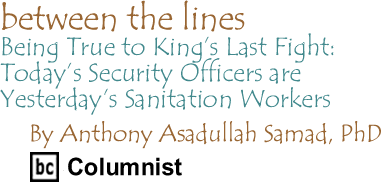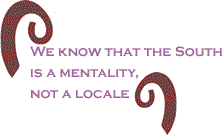
|
|||||||||||||||||||||
 |
|||||||||||||||||||||
 |
||||||||||
|
||||||||||
|
The current issue is always free to everyone If
you need the access available to a |
||||||||||
 |
||||||||||
 |
||||||||||
 |
||||||||||
2008 represents the fortieth anniversary of the assassination of America�s 20th Century social reformer, Dr. Martin Luther King, Jr. This week is also where King has transitioned from conscious social reformer to �dreamer� - really an insult to the legacy and the memory of King. We will hear more �King-isms� than one can stand, given that people today spend more time quoting �the Dreamer� than living the dream. It�s up to us to emphasize the social and economic reform legacy of King. Leave to �dream� stuff to the dreamers who are still dreamin�, forty years later, that change comes through hopeful dreaming.� King�s assassination is still America�s worse nightmare. He wasn�t just the savior of black folk; he offered America a way out of its racial quagmire, an offer America rejected. America wasn�t ready for socio-political reform based on racial and economic equality. So, now we�re all stuck in a bad dream. Those who understand America�s socio-political construction efforts of the last fifty years understand that it was (is) based on the reinforcement of human subjugation through race economics. Racism in America has always been economic. The avoidance of class conflict in America has always been based on the maintenance of a race caste system where no matter how poorly the poorest of the poor were doing, they would never be the worst-off of the poor as long as race trumped class. The assurance to poor Whites was and is that Blacks will always be at the bottom rung of the economic strata. Nothing demonstrated this realization more than King�s shift from social justice to economic justice in the last years of his life. King recognized that there could be no social justice as long as there were people who could never maintain a quality standard of life if they didn�t make a decent wage in an honorable line of work. No one should be made to feel that they are less than a man if they are willing to an honest day�s work. Any man willing to make an honest living should make an honest wage, and it was on that principle that King gave his life by standing up for striking sanitation workers. Their legendary mantra was simply, I AM A MAN. The legacy of the Memphis Sanitation Workers strike lives today in the form of the Los Angeles Security Officers collective bargaining movement. Security officers are currently engaged in their first-ever contract negotiation with major commercial giants, and as in 1968, when the City of Memphis didn�t see the dignity in paying black men a decent wage for providing a vital municipal service, corporate real estate giants don�t see the dignity in paying security officers a decent wage in 2008. It�s the same fight (dignity in work) when you consider this: Los Angeles is in the midst of a massive commercial renaissance that is producing some the highest profile commercial assets in the region.
How can the nation�s second largest city, with one of the most affluent standards of living, ask people to provide such a vital municipal service to the city�s vulnerable infrastructure and assets, and not pay them a dignified wage? Many security officers between circles of affluence to poverty in a single day. Why should they work to protect the �American dream� and not be able to live it? The suppression of security officer wages is unconscionable when you consider that there are twice as many private security officers in the United States as there are police officers. With over one million private officers throughout the country, the private security industry is one of the top ten fastest growing industries in the nation. But there is a bifurcation in compensation when it comes to paying security officers of color. The corporate real estate magnets in Los Angeles pay less to their security officers to protect their prized commercial assets than they pay to janitors who work in these buildings. If they just gave security officers equal pay to that which they currently give the janitors, it would add more than $50 million a year into the economy of South Los Angeles - the community in which most of the security officers live. That�s significant because it lifts the quality of life for all who live in these communities.
As an aside, the other person who has been mentioned as a potential democratic Gubernatorial candidate (along with Villaraigosa), San Francisco Mayor, Gavin Newsome, played �King� a few weeks ago in facilitating a contract with higher wages and family healthcare for 4,000 private security officers throughout the Bay Area. It is being heralded as the best-ever private security officer contract anywhere and the model for other cities to follow. Newsome is now �King� of the North (Northern California), but this is the South (Southern California) - and we know the South has had a whole different political reality in this country, wherever the "South" exists: up South (Chicago, Detroit, Boston), down South (Jackson, Birmingham, New Orleans, Miami), around South (Dallas, Tulsa, Richmond, Memphis) and out-South (Phoenix, Las Vegas and Los Angeles). We know that the South is a mentality, not a locale. But as King said, �There is never a bad time to stand up for right.� It�s time for Villaraigosa to stand up for right on this issue. Negotiations on the Los Angeles private security officers� contract can get finished with the Mayor�s help. It�s one thing to play �King;� it�s another thing to be King. King made the ultimate sacrifice for working poor people. We�ll see if the Mayor is prepared to make any sacrifice at all, on the part of mostly black, private security officers. Villaraigosa has done the same for others; now it�s time for him to do it for today�s Memphis Sanitation workers. Only they�re not sanitation workers in Memphis. They�re private security officers in Los Angeles - his city - and they could use a King right now. Word to Mayor Villaraigosa ; don�t play a King when it comes to the poor. Be a King. BlackCommentator.com
Columnist
Dr. Anthony Asadullah Samad is a national columnist, managing
director of the Urban Issues Forum
and author of the new book, Saving
The Race: Empowerment Through Wisdom
|
||||||||||
| January 17, 2008 Issue 260 |
|
| Executive Editor: Bill Fletcher, Jr. |
| Publisher: Peter Gamble |
| Printer Friendly Version in resizeable plain text format format |
 |
 |
 |
 |
| |
| |






















 The
City of Los Angeles is one of the nation�s three top terrorist
targets and yet a security officer in Los Angeles works full-time
to protect multi-million dollar assets at poverty wages - $8.50
an hour with no healthcare benefits (livable wage in Los Angeles
is $22.00 an hour). There is such a lack of dignity in the work
of security officers that the job turnover is 300%, higher even
than the fast food industry. The industry wage standard in L.A.
is so low that many full time security officers qualify for
food stamps and other public assistance. Most security officers
must work a second job to make ends meet. The most significant
aspect of this issue is that there are 4,000 private security
workers in Los Angeles and 70% of them are African Americans.
The
City of Los Angeles is one of the nation�s three top terrorist
targets and yet a security officer in Los Angeles works full-time
to protect multi-million dollar assets at poverty wages - $8.50
an hour with no healthcare benefits (livable wage in Los Angeles
is $22.00 an hour). There is such a lack of dignity in the work
of security officers that the job turnover is 300%, higher even
than the fast food industry. The industry wage standard in L.A.
is so low that many full time security officers qualify for
food stamps and other public assistance. Most security officers
must work a second job to make ends meet. The most significant
aspect of this issue is that there are 4,000 private security
workers in Los Angeles and 70% of them are African Americans. It�s
now time for a �King� to step into the middle of these negotiations
and bring dignity to both workers and the negotiation process
of the indignant, union-busting real estate business leaders.
Mayor Antonio Villaraigosa, who still claims he�s black L.A.�s
�best friend,� can use his labor negotiation background (that
moved the bus strike a few years back) to move these negotiations
in a way that will create thousands of jobs with decent wage
and healthcare benefit for black workers at a time when the
city needs it most. The Mayor likes to play �King.� Nobody will
quote King more than the Mayor this week. Now is his chance
to be a King in standing with economic justice.
It�s
now time for a �King� to step into the middle of these negotiations
and bring dignity to both workers and the negotiation process
of the indignant, union-busting real estate business leaders.
Mayor Antonio Villaraigosa, who still claims he�s black L.A.�s
�best friend,� can use his labor negotiation background (that
moved the bus strike a few years back) to move these negotiations
in a way that will create thousands of jobs with decent wage
and healthcare benefit for black workers at a time when the
city needs it most. The Mayor likes to play �King.� Nobody will
quote King more than the Mayor this week. Now is his chance
to be a King in standing with economic justice. 




